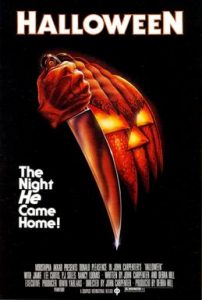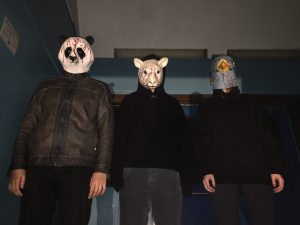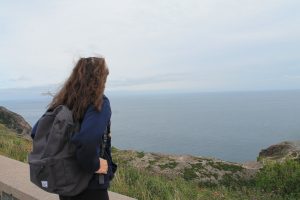Horror is actually super, duper scary. I legitimately had a nightmare last night that Michael Meyers was chasing me through my house, and I cannot tell you how jittery I am, writing this right now. I honestly didn’t really believe that I would be too affected when we were first introduced to the new Horror Unit in PLP 12. But after sitting through hours of creepy movies, reading horror novels, and even creating our own 30 minute film full of terror, I can now confidently say I am a little bit scarred.
So, instead of recounting all the terrifying tales I have from this unit, I am going to skip directly to where life got a whole lot scarier: The Beginning of the “Horrifying Homemade Horror Movie” (curtesy of PLP 12). When Ms. Willemse and Mr. Hughes first pitched the major project to us, I was a bit confused. We were going to be creating a short film as a whole class, that represents and answers the driving question: “how does horror reflect and comment on our society?” By looking at literature, researching virtually everything, and analyzing historical events and timelines, we were able to conclude that horror is pretty much a reflection of our true inner nature and being.
The Beginning of Production:
So somehow, we were going to have to show this in our own film, and simultaneously work well as a functioning movie production team and make it good. The last time we attempted this project, it didn’t turn out too well. I guess our teachers knew we had all learned from our previous mistakes (take a look at our Macbeth project here), and could apply this learning for round two. As we began signing up for roles, I decided I would apply to be a Screenwriter. I know I enjoy writing and I thought that I would be a good contribution to the script team. As production started, I knew I had underestimated the work that was required from us to get the script done…we had pretty much ONE WEEK to get it written and hand it over to the story boarders.
The Off-Screen Stress of Being a Screenwriter:
Screenwriters are extremely important in film production, as they create the story and script that the whole thing will be based on. Kirby, Tom, Matthew, and I came up with the ideas, characters, and plot. We worked efficiently and unbelievably quickly, to make sure that we didn’t drag the whole production behind. We were on a time crunch at the beginning, and the movie couldn’t begin to be made without what we had to produce. I was very proud of our final product, and had high hopes for what it could be transformed into on screen. That being said, our jobs weren’t complete yet. I still arrived at every scheduled filming time, and continuously offered advice for the direction of the film, as did my fellow scriptwriters. We made great efforts to assist other production departments, yet I felt as though I wasn’t needed much, post writing.
I felt kind of helpless, like I had handed the steering wheel to the next department, and I wasn’t allowed to drive anymore. This got me down during the whole film, as I saw quickly that plans were changing and the story was being altered; I felt very useless. Unfortunately, I didn’t speak up very much about my concerns, and simply questioned how I could help along the way. I realized that there just weren’t things for me to do. But, I honestly felt as though we had a very difficult job, and handled the pressure extremely well. I certainly know we did our very best, and unfortunately it wasn’t fully reflected in the final movie product.
Skill Improvement:
As in every PLP project, there are alway skills and aspects of learning that you’re going to improve on, and some you had no idea you needed to use. During this project, I 100% improved on my time management, as us screenwriters were told we needed to produce six scenes in five days, and came out with a whole script in that same time frame. We maximized every moment we had to get it done, and I’m so happy that I pulled myself together and got it completed. I think I also learned how to make my writing flow a lot better, and transformed it into natural dialogue. Script writing is quite a bit different than just regular writing. You have to build off the fact that there will be real actors saying whatever you give them to say, and if it isn’t naturalized, it sounds pretty awful. We tried to really make it smooth and in sync with the whole ambiance of the story, and I really improved on focussing in my writing style.
The Movie Verdict:
Our film is called “Locked In”, and is based around four high school students who end up in detention on a Friday night. They are tormented by masked figures who are avenging a girl that the students bullied. They are killed one by one in the school, until there is one boy left, and he is spared as a way to remind him of the damage he created; leaving him knowing that he caused the murders was the largest punishment of all.
As we watched the premiere screening of our movie, I immediately realized that we had failed to execute the most important aspect of a horror film: it just wasn’t scary. This sad truth knocked me over like a brick to the face, and it was actually quite depressing. It definitely had the potential to be creepy and horrific, yet we just missed the mark. As always, we focussed too much on how it looked, and the overall drama of production, and somehow overlooked the link between the story and the portrayal onscreen.
Originally, there was enough of a backstory to understand the motives behind the murders, but some of those parts were cut out of the movie (or not filmed), and without them, there wasn’t enough information to understand pretty much the whole movie. It’s small points like these that were crucial to the story, and on my part, I definitely could have communicated better with storyboard and my DRI to get this message across.
So, yes, our movie was flawed, and it ended up straying away a bit from our driving question. But this doesn’t mean that it was a bad movie. So many things went right, and I think we should be celebrating our successes, rather than completely fixating our attention on the things that didn’t go great. It’s hard to work in a huge group, with each individual bringing different ideas and opinions to the table. It’s also hard to listen to everyone, you simply can’t. Working in this environment, you need a small group of representatives who make the final decisions. We attempted this, and yet other people (who weren’t assigned decision makers), still had something to say about everything. This makes it tough on the whole production. I know each and every one of us has officially recognized this error, and will improve on this weakness in the future. I know I will.
What I’ve Learned About Horror:
As I said at the beginning of this post, horror is scary, that’s no secret. But why is it scary? What about the horror genre creeps us out? Horror is a representation of society’s deepest fears and primal natures. All the things we strive to keep hidden are exposed, and social norms are tipped and disturbed. This distorted mirror image of humanity is what terrifies us. In class we also discussed different elements of horror, and discovered the precise points we are scared of.
In the end, horror gives us a chance to look within, and come out more powerful. The more we reflect on our most horrific parts of ourselves, the more we can avoid them, and come out stronger.



Leave a Reply